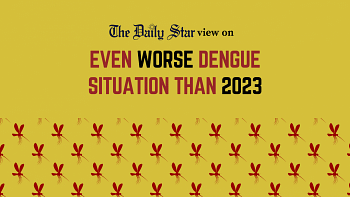Don’t mess up dengue control this time

When it comes to dengue, it seems we are stuck in an endless loop of despair and failures. Last year, we suffered the worst outbreak in our history, with Bangladesh also becoming the worst-affected country in the world in terms of deaths, recording 1,705 casualties. The number of cases recorded was also the highest ever: more than 3.2 lakh. This year, too, the signs are quite worrying: between January 1 and May 6, a total of 2,323 dengue cases have been reported, which is more than double the caseload reported during the same period last year. Meanwhile, 23 deaths have been reported between January and April—again, more than double the death toll during the same period in 2023.
These numbers suggest that we could be headed for an even more dire situation this year unless timely and appropriate actions are taken, as experts have recently pointed out at a discussion on dengue preparedness. One of the speakers, a professor of medical entomology, said research was necessary to figure out if Aedes mosquitoes, the carrier of dengue virus, had gained more transmission capacity. Another expert said testing and controlling the mosquito population were key to tackling dengue. According to another report by this daily, experts suggested having all the healthcare facilities that treat dengue—not just the designated few—to report to the health authorities. Complete data is crucial not only to get the real picture on the ground, but also to enable proper interventions.
Indeed, enforcing preventive measures is the best way to keep dengue under control. But can we trust the relevant authorities with this task? Their performance during the previous outbreaks, especially in 2023, does not invoke much confidence. What we saw last year in the name of dengue management was haphazardly taken attempts in response to an escalating infection rate, most of which turned out to be ineffective. What's worse, the authorities even tried to shift the blame for their own failure to the people. But we all know where the problem lies. Lack of foresight, lack of collaboration, mismanagement, and a certain level of incompetence marred efforts to tackle the outbreak.
This cannot be repeated again. It is vital that the relevant authorities learn from the mistakes made last year and take steps to rectify them. To this end, experts have already offered many recommendations. The government must take these into consideration to devise and employ a national plan of action involving all the relevant government agencies, including the city corporations and municipalities. Instead of acting on their own, if these agencies work in tandem following a plan backed by proper data and research, we believe it will be possible to beat dengue this year.


 For all latest news, follow The Daily Star's Google News channel.
For all latest news, follow The Daily Star's Google News channel. 










Comments